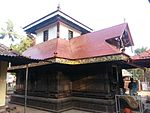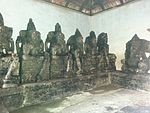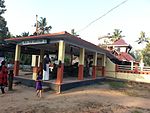Niranam Thrikkapaleeswaram Dakshinamurthy Temple
| Niranam Thrikkapaleeswaram Dakshinamurthy Temple | |
|---|---|
നിരണം തൃക്കപാലീശ്വരം ക്ഷേത്രം | |
 Temple Side view | |
| Religion | |
| Affiliation | Hinduism |
| District | Pathanamthitta |
| Deity | Dakshinamurthy |
| Festivals | Maha Shivaratri |
| Location | |
| Location | Niranam, Thiruvalla |
| State | Kerala |
| Country | |
| Geographic coordinates | 9°20′52″N 76°31′43″E / 9.347913°N 76.5285885°E |
| Architecture | |
| Type | Kerala style |
| Completed | Not known |
| Temple(s) | 1 |
| Website | |
| http://www.thrikkapaleeswara.org/ | |
Niranam Thrikkapaleeswaram Dakshinamurthy Temple, is an ancient Hindu temple dedicated to Lord Shiva is situated on the banks of the Pampa river at Niranam of Pathanamthitta District in Kerala state in India. This temple is a classic example of the Dravidian style of architecture. The temple is the abode of Dakshinamurthy (is an aspect of the Lord Shiva as a guru (teacher) of all types of knowledge).[1][2] The deity of Thrikkapaleeswaram is located in main Sanctum Sanctorum facing east. According to folklore, sage Parasurama has installed the idol.[3] The temple is a part of the 108 famous Shiva temples in Kerala.[4] This is one of the three Thrikkapaleeswaram temples mentioned in 108 Shiva temples. Two other temples situated in Peralassery (Kadachira Sri Thrikkapalam Siva Temple) in Kannur district and Nadapuram (Nadapuram Iringannur Siva Temple) in Kozhikode district.[5]
Saptha Matha[]

The temple have dedicated statues of Sapthamatha in the separate Sanctum Sanctorum which is not seen in other temple is very special. The major temples in the southern part of Sreekovil (sanctum sanctorum) are in the form of seven balikallu. There are special offerings for them in morning, noon and evening. Sapta mathas are different forms of Adi Parashakti; the deities are Brahmani, Vaishnavi, Maheswari, Kaumari, Varahi, Indrani and Chamundi.[6]
Temple, History[]
It is an ancient temple. The temple is located in the center of the Pamba River and Manimala River at Niranam. Thrikkapaliswaran is here in the mind of the Vidya Deva Dakshinamurthy. The temple and the place were popular in the period of Niranam poets (Kannassa Kavikal). Several long periods of time had taken the forgotten time. In recent times, the famous astrologer Kanippayyur Shankaran Namboodiripad has conducted a "deva prashna" for the redevelopments of temple. One of the major attractions here is the Shiva lingam. The Shiva lingam is a unique feature and this lingam stone only seen in Himalayas. The main idol is in the form of Kapaleeshvaran Dakshinamurthy is facing east in the main Sanctum Sanctorum.
Niranam Poets[]
The Niranam poets, also known as the Kannassan poets, were three poets from the same family, 'Madhava Panikkar', 'Sankara Panikkar,' and 'Rama Panikkar' were famous poet and devotee of Thrikkapaleeswaran (Dakshinamurthy), who lived near to temple at Niranam.[7] Their works mainly comprised translation and adaptation of Sanskrit epics and Puranic works and were for devotional purposes. They lived between 1350 and 1450 C.E.[8]
See also[]
| Wikimedia Commons has media related to Thrikkapaleeswara Temple, Niranam. |
- 108 Shiva Temples
- Temples of Kerala
- Kadachira Sri Thrikkapalam Siva Temple
- Nadapuram Iringannur Siva Temple
Temple Photos[]
- Niranam Thrikkapaleeswaram Dakshinamurthy Temple

Double Storey Srikovil

Srikovil (Before rebuilt)

Sapthamathakal
(very rare)
Rishabha Statue

Anakottil
References[]
- ^ "Niranam Thrikkapaleeswara Dhakshinamurthy Temple". www.thrikkapaleeswara.org.
- ^ Dictionary of Hindu Lore and Legend (ISBN 0-500-51088-1) by Anna Dallapiccola
- ^ "Tiruvalla - Niranam - Thrikkapaleswaram - Lord Shiva Temples of Pattanamthitta District - Abode of God Shiva On the Internet - Name of Hara encompass; World be free from Suffering". www.shaivam.org.
- ^ "108 Shiva temples of Kerala - Worshiped by Parasurama Information". www.vaikhari.org.
- ^ "108 Shiva temples of Kerala - Worshiped by Parasurama Information 46. Trukkapaleeswaram Mahadeva Temple Nadapuram, 47. Trukkapaleeswaram Mahadeva Temple Peralassery, 48. Trukkapaleeswaram Mahadeva Temple Niranam". www.vaikhari.org.
- ^ Leeming, David; Fee, Christopher (2016). The Goddess: Myths of the Great Mother. Reaktion Books. ISBN 9781780235387.
- ^ Menon, A. Sreedhara (1979). Social and cultural history of Kerala. Sterling. p. 335.
- ^ "The Niranam Poets". Public Relations Department Kerala State Government. Archived from the original on 14 October 2014.
- 108 Shiva Temples
- Shiva temples in Kerala
- Hindu temples in Pathanamthitta district





